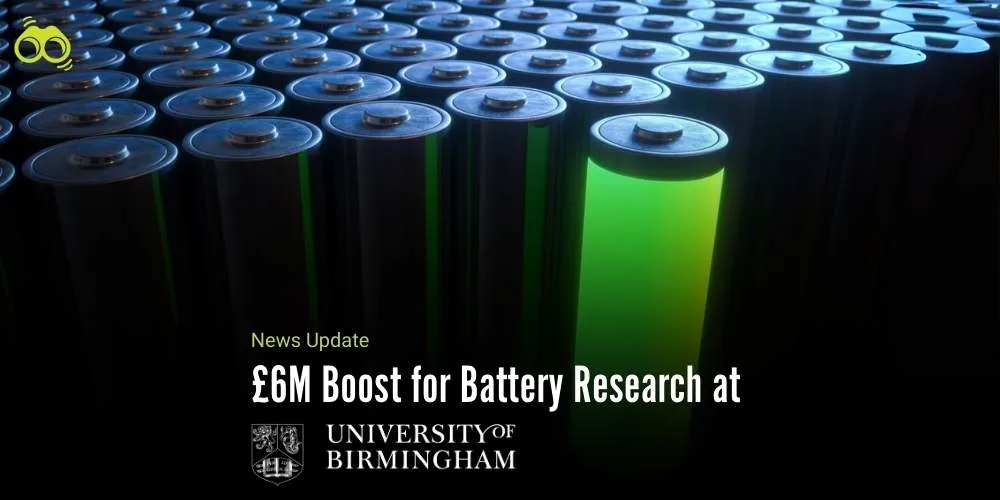Birmingham Uni Launches New Battery Research with £6M Funding and National Collaboration
New Research at University of Birmingham Tackles Formation and Ageing in Lithium-Ion Cells
The University of Birmingham is leading a £6 million research project called FAST, which stands for Formation, Ageing, and Sustainability Testing, aimed at improving one of the most energy-intensive stages of lithium-ion battery manufacturing. This initiative focuses on the final steps of cell production, formation, ageing, and testing, which are essential for building protective layers inside the battery that affect its safety, performance, and lifespan. These processes currently consume a large amount of energy, time, and space, making them a key area for innovation and efficiency.
Funded by the Faraday Institution as part of a wider £9 million investment in applied battery research, the FAST project will initially concentrate on high-nickel NMC cathodes paired with graphite or graphite–silicon anodes. These materials offer higher energy density but require careful handling during formation to ensure long-term stability. Professor Emma Kendrick, who leads the project, explained that this work bridges the gap between academic research and industrial application, helping to unlock sustainability benefits across the battery supply chain.
The University of Birmingham is working with top UK institutions, including Warwick, Cambridge, Nottingham, and Oxford, as well as four industry partners and the UK Battery Industrialisation Centre. Together, they aim to develop new formation protocols and scalable materials science methods, producing high-quality pouch cells and using sensor-embedded cells to monitor pressure, gas, and strain in real time. Advanced tools such as operando X-ray diffraction, spectroscopy, and magnetic resonance imaging will be used to study chemical and physical changes during battery formation, providing valuable data to improve future manufacturing techniques.
This project is part of the UK’s £452 million Battery Innovation Programme, announced by the Department for Business and Trade in June 2025, which supports the country’s ambition to lead in advanced battery manufacturing and clean energy research. Alongside FAST, the Faraday Institution is also launching the 3D-CAT project, led by Oxford, to explore lithium-rich 3D cathode materials with the potential to reshape battery design. The FAST project will run until September 2028, with further funding expected in 2026, and will also contribute to training PhD students and early-career researchers, supporting the UK’s wider skills agenda.
The University of Birmingham, recognised globally for its research excellence, is proud to play a central role in this transformative work, and its Dubai campus may also support international collaboration and knowledge sharing. By improving battery formation and ageing processes, the FAST project is expected to influence gigafactory design, battery recycling, and electric vehicle supply chains, helping the UK compete globally in science and sustainable technology. This initiative confirms Birmingham’s leadership in battery science and its commitment to driving innovation that benefits both industry and society.
Editor’s Note
The University of Birmingham is one of the UK’s leading research-intensive institutions, known for its strong focus on science, engineering, and sustainability. With a global reputation for innovation and collaboration, the university continues to play a vital role in solving real-world challenges through advanced research. The launch of the £6 million FAST project is a major step forward in battery science. Led by Birmingham and supported by the Faraday Institution, this research aims to improve the final stages of lithium-ion battery production, formation, ageing, and testing, which currently use a lot of energy, time, and space. These steps are essential for making batteries safe, long-lasting, and efficient. What makes this project so important is its potential to change how batteries are made. By using smart sensors and advanced tools like X-ray imaging and spectroscopy, researchers will be able to see how batteries behave during production and find better ways to build them. This could lead to faster manufacturing, lower costs, and greener technologies. The FAST project also creates new opportunities for other universities, industry partners, and young researchers. It brings together experts from Birmingham, Warwick, Cambridge, Nottingham, Oxford, and the UK Battery Industrialisation Centre, showing how teamwork can drive progress. It will also train PhD students and early-career scientists, helping to build the next generation of battery experts. This research is part of the UK’s £452 million Battery Innovation Programme, which supports the country’s goal to become a world leader in clean energy and electric vehicle technology. With growing demand for better batteries in everything from smartphones to electric cars, the work done at Birmingham will help shape the future of energy storage and sustainability.
According to Skoobuzz, the University of Birmingham is driving progress in battery science, contributing to a cleaner, smarter future for all through its leadership in this project.














0 Comments (Please Login To Continue)